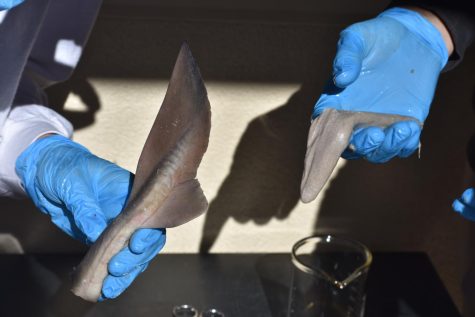Elective spotlight: Marine Biology
February 22, 2022
From neon jellyfish to ghoulish anglerfish, the allure of the unique flora and fauna of the ocean calls to many scientists. By taking Marine Biology, students at Palo Alto High School can begin to understand the mysteries of the vast ocean covering our planet.
Marine Biology is a second-year biology course offered to upperclassmen who have completed Biology or Biology Honors. According to teacher Michael Lupoli, the course focuses on the study of life in the oceans along with units about the human impact on marine ecosystems.

The course features hands-on activities, including a shark dissection and field trip to the Monterey Bay Aquarium. Students watch documentaries and learn about topics ranging from ecology to evolution, all through the lens of marine biology.
“This course is really about developing an interest,” Lupoli said. “A lot of people, especially little kids, fall in love with the ocean.”
According to Lupoli, students also further their understanding of climate change’s impact on the ocean, which includes learning about coral bleaching in coral reefs and the changing ocean temperatures.
“Another good reason to learn Marine Biology is if you have a strong interest in [ocean] preservation and climate change,” Lupoli said.
According to senior Anneke Salvadori, who is currently enrolled in the class, one of the most enjoyable aspects of the course is being able to further explore marine biology-related concepts.
“I really like the fact that we get to spend a lot of time learning in depth about things that are just interesting,” Salvadori said. “We spent a whole class learning about camouflage and how octopus and squid are able to adapt.”


